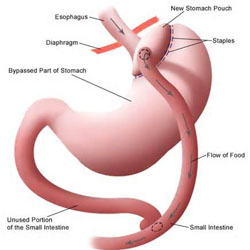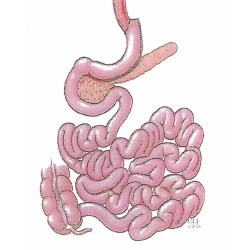Info
Frequently Asked Questions
- Patient must be at least 100 pounds or more over ideal body weight, or have a Body Mass Index (BMI) of 40 or more - BMI can be calculated using the chart below. A Patient may be considered for surgery with a BMI of 35 - 40 with certain severe co-morbidities.
- Patient must have previous unsuccessful efforts at weight loss, including medically supervised diet plans, exercise, and behavioral modification programs.
- Patient must be between the ages of 18 and 60.
- Patient must demonstrate a willingness to make the necessary changes in lifestyle and eating habits.
- Patient must demonstrate a commitment to the Center for Obesity Surgery's behavioral modification and support group program, as well as long term follow-up.
- Medical consultation. During your initial consultation, you and Dr. Afram will determine whether you are a candidate for obesity surgery. You will be provided a detailed explanation of the surgical procedure and the expected recuperation. You will discuss how your eating habits will change for the better after surgery, and you will have an opportunity to have all your questions answered.
- Medical clearance. Before surgery you will undergo a comprehensive medical evaluation to ensure your fitness for surgery. This medical evaluation is scheduled for you by the Center for Obesity Surgery, and includes an assessment of general fitness, blood tests, an EKG, a chest x-ray, a pulmonary function test, an upper gastrointestinal x-ray, a gall bladder ultrasound, and other tests as needed. In addition, you will receive a pre-operative evaluation with an anesthesiologist. Licensed medical professionals affiliated with either the Center for Obesity Surgery or George WashingtonUniversity Hospital perform all components of the medical evaluation
- Psychological screening. This screening involves taking a personality inventory and participating in a one-on-one interview with the program's licensed psychologist. The purpose of the psychological screening is to ensure that there is no severe psychological issue that would compromise your chances for success on the program, and to ensure you'll have adequate personalized support as you begin your post-operative life.
- Nutritional consultation. During a one-on-one appointment with the program nutritionist you will receive information on what and how you'll be eating after surgery. You will discuss eating immediately following surgery, making the transition to solid food, developing a long-term strategy for success, and handling situations like eating out after surgery. The nutritionist will also discuss vitamins and other nutritional supplements with you. Additionally, you will receive a copy of the Center for Obesity Surgery's nutrition manual.
- Support group. All pre-operative patients are required to attend at least one session of our patient support group. At this support group you will have the opportunity to meet post-operative patients and have your questions answered by the real experts! Of course, family, friends, and significant others may participate in the support group. As an adjunct to the support group patients are invited to join the online support group at AframOSSG@eGroups.com This group of pre and post op patients continues the relationships and support offered in our groups through an online list serve community.
Post-operative support
After surgery, you'll find that the Center for Obesity Surgery offers a wide variety of post-operative support:
- Support group. The program therapist, registered dietitian, and fitness coordinator co-facilitate a weekly scheduled support group for patients. At these meetings patients can raise any and all issues, questions and concerns they might have as they adjust to post-operative life. Attention is also paid to issues surrounding long-term maintenance of weight loss results. Some time is reserved at the end of each session to deal with food-related questions. Patients are required to attend support group regularly for the first six months following surgery. Additionally, from time to time the therapist organizes special sessions centered on special topics raised by patients.
- OSSG List. As a supplement to the support group program, the Center maintains a list serve that handles patient comments, questions and issues. Pre-op and post-op patients are invited to join This group of patients continues the relationships and support offered in our groups through an online list serve community.
- Follow-up. All post-operative patients will schedule visits with Dr. Afram monthly for the first year, every 3 months in the second year, and every 6 months thereafter.
- Nutritional Consultation. The program dietitian and nutritionists are available to answer your questions and address food-related issues as they arise. You will receive an initial nutrition consultation before surgery to prepare you for your post surgery eating plan. We recommend nutrition follow-up sessions every three months for the first two years and every 6 months thereafter.
- Individual therapy. Should you find it necessary, the program psychologist is available for private counseling sessions.
- Exercise program. Exercise is recommended 6 to 8 weeks after surgery. Dr. Afram and the fitness coordinator can provide suggestions for developing an exercise program, and of course, fellow patients are an excellent resource.
- Plastic and Reconstructive Surgery. The center offers plastic, reconstructive and cosmetic surgery for post-op patients.
- Preferred protein and vitamin supplements . Our medical and nutrition staff only recommends the highest quality protein and vitamin supplements. Nutrient Fortified Protein Foods and Meals
Vitamins and Minerals necessary for post-surgery health For discount codes, supplement questions or for more information about our preferred distributors please contact Christine Haas at 571-241-7000 or Christine.h.haas@gmail.com
- Most insurance plans have coverage for obesity surgery. Because the surgery is done for medical and not cosmetic reasons we are therefore able to substantiate the medical necessity for the gastric bypass procedure. We accept most insurance plans. When you come in to meet with the doctors, you will meet Bernadette, the patient coordinator, who will give you all of the details regarding your insurance policy. Contact us for further details.
- Patient Financing is available and as a courtesy to our patients and we offer one year interest free.
Information on Body Mass Index (BMI)
In calculating your ideal body weight, physicians use a formula called the Body Mass Index (BMI), which is a number that expresses the relationship between your height and weight.
Body Mass Index is interpreted as follows:
| <20 | Underweight |
| 20 - 24.9 | 20-24.9 Ideal Weight |
| 25 - 29.9 | Overweight |
| 30 - 39.9 | Obese |
| 40> | Morbidly Obese |
The BMI calculator below will determine your individual BMI
surgery options
LAPAROSCOPIC ROUX-EN-Y GASTRIC BYPASS
In this operation the stomach is divided into two compartments with several rows of titanium staples.Read More
LAPAROSCOPIC SLEEVE GASTERECTOMY
The Laparoscopic Sleeve Gastrectomy - often called the sleeve - is performed by removing approximately 80 percent of the stomach. Read More
REVISION BARIATRIC SURGERY
Failure of Bariatric procedures can happen 3-7% of all Bariatric Surgery. Read More
As with any major abdominal surgery there are potential risks. These risks can be further complicated in operations on severely obese patients. It is important that you consider these potential risks, and discuss them with Dr. Afram and your own physician, when deciding whether to have surgery. Potential surgical risks include possible respiratory problems, infections, bleeding, bowel obstruction, leakage of the bowel connections, and obstruction of the stomach outlet. After performing over 3000 gastric bypass operations, Dr. Afram and his team have developed successful strategies for minimizing any potential risks.
POTENTIAL SIDE EFFECTS OF THE SURGERY
Due to the physical changes caused by the gastric bypass surgery, there are potential side effects that result from the surgery and your new way of eating. Due to restricted eating, there is a potential for deficiencies in protein, as well as certain vitamins and minerals. Use of an over-the-counter multivitamin, fortified with iron and calcium, and other nutritional supplements, determined on an individual basis, can help mitigate this risk.
Some patients experience nausea, food intolerance, changed bowel habits, transient hair loss, and loss of muscle mass. It is important to note that not all patients experience these side effects and these side effects are usually transitory. If you experience any of these post-operative side effects, Dr. Afram and the nutritionist are available for immediate consultation.
Gall bladder disease is a potential side effect due to the rapid weight loss most patients experience after the surgery. To minimize this risk Dr. Afram may prescribe medication, taken regularly for several months after surgery.
A word about pregnancy.
Infertility can be a significant co-morbidity for severely obese women. Many obese women experience irregular or non-existent menstrual cycles. Surgery for obesity often corrects these problems. Due to the increased nutritional needs of pregnancy, we recommend that patients not get pregnant for at least one to two years after surgery, when the initial rapid weight loss subsides. Patients should discuss birth control methods with their primary care physician or obstetrician/gynecologist. After the initial year, pregnancy is safe and many patients, who had suffered from infertility prior to surgery, have delivered healthy babies.
RESULTS
Most of our patients are very satisfied with the results of their operation. Overwhelmingly, patients have found that they lose 50 to 90 percent of their excess weight, and maintain that weight loss long-term.
Maximum effectiveness depends on the level of patient participation in the behavioral modification and nutritional programs, as well as an increase in physical activities and exercise on a regular basis. Other factors, such as age, sex, and initial weight at the time of surgery should also be considered. Weight loss surgery is not a magic bullet. It is, however, a powerful tool that has successfully helped many people achieve and maintain permanent weight loss. Your active participation in, and commitment to, the life style changes, exercise, and eating habits that weight loss surgery requires is a necessary component to your ultimate success.
Most medical diseases are improved or cured. Obesity related diseases are improved dramatically.
- High Blood Pressure can be often alleviated or eliminated by weight loss surgery
- High Blood Cholesterol in 80% of the patients can be alleviated or eliminated and in as little as 2-3 months post-operatively
- Heart Disease in obese individuals is certainly more likely to be experienced when compared to persons who are of average weight and adhere to a strict diet and exercise regimen. There is no hard and fast statistical data to definitively prove that weight loss surgery reduces the risk of cardiovascular disease, however, common sense would dictate that if we can significantly reduce many of the co-morbidities that we experienced as someone that is obese, we can likewise that our health may be much improved if not totally restored.
- Diabetes Mellitus can be cured or tremendously improved. Complications can be controlled based on many post gastric bypass studies.
- Abnormal Glucose Tolerance, or "Borderline Diabetes" is even more likely reversed by Gastric Bypass. Since this condition becomes diabetes in many cases, the operation can frequently prevent diabetes as well
- Asthma sufferers may find that they have fewer and less severe attacks, or sometimes none at all. When asthma is associated with gastroesophageal reflux disease, it is particularly benefited by gastric bypass.
- Sleep Apnea Syndrome sufferers can receive dramatic effects and many within a year or so of surgery find their symptoms were completely gone and they ever stopped snoring completely!
- Gastroesophageal Reflux Disease can be greatly relieved of all symptoms within as little as a few days of surgery
- Gallbladder Disease can be surgically handled at the time of weight loss surgery if your doctor has cause to believe that gallstones are present.
- Stress Urinary Incontinence responds dramatically to weight loss, usually by becoming completely controlled. A person who is still troubled by incontinence can choose to have specific corrective surgery later, with much greater chance of a successful outcome, with a reduced body weight.
- Low Back Pain and Degererative Disk Disease, and Degenerative Joint Disease can be considerable relieved with weight loss, and greater comfort may be experienced even after as few as 30 pounds are lost.
- Major improvement in the quality of life and improvement in self-esteem and self-confidence.















